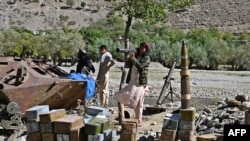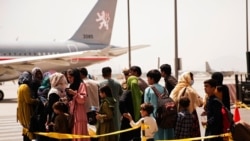U.S. Secretary of State Antony Blinken delivered to Congress this week an unwavering defense of the Biden administration's exit from Afghanistan, in which he outlined the administration's priorities for the country going forward.
Here are those priorities and the challenges in meeting them.
Assisting Americans and at-risk Afghans
Blinken said the administration was continuing "relentless efforts" to help the fewer than 100 remaining Americans as well as potentially thousands of at-risk Afghans to leave the country if they choose.
Citing the "ongoing terrorist threat to operations of this nature," the State Department declined to provide an official count of Afghans attempting to flee.
A VOA source with knowledge of the evacuation process says that as of Sunday, at least 1,300 at-risk Afghans and U.S.-affiliated individuals are seeking to leave through the Kabul airport or overland transport. Approximately 8,200 are trying to depart from the Mazar-e-Sharif airport, where charter planes have waited for weeks to be cleared for departure.
"The United States has pulled every lever available to us to facilitate the departure of these charter flights from Mazar," a State Department spokesman said.
But those assisting evacuations are losing patience and accuse the administration of offering "empty promises."
"As the days go by and the situation becomes more dire for our 704 passengers, it's hard to have any faith in political promises," independent humanitarian Hazami Barmada told VOA. In recent weeks, she has been assisting the evacuation of a group that includes nine American citizens, nine lawful permanent residents of the U.S., and 170 Special Immigrant Visa holders and their families. As of Wednesday, the group is still stranded in Mazar-e-Sharif.
Engaging diplomatically with Taliban
The U.S. and other Western nations have moved diplomatic operations from Kabul to Doha, Qatar. Blinken said the U.S. was prepared to engage with the Taliban from the Qatari capital in coordination with allies and partners "on the basis of whether or not it advances our interests."
With military intervention no longer a point of leverage for the foreseeable future, the challenge is "how to be diplomatic with a terrorist group," said Brian O'Toole, a nonresident senior fellow at the Atlantic Council.
Paired with the right leverage, diplomacy may be effective, O'Toole said. This includes the previous Afghan government's $9.5 billion in assets currently frozen in American banks, U.S. dominance over the global financial market, and threats of United Nations and Western sanctions or trade restrictions. Incentives could include offers of international aid, budgetary assistance and recognition of the Taliban government.
Blinken said the U.S. has organized key countries to leverage their combined influence over the Taliban. Last week, he led a ministerial meeting of 22 countries plus NATO, the EU, and the United Nations to align these efforts.
The effectiveness of the soft power approach also depends on whether the Taliban will continue to behave as an extremist group or move toward governing Afghanistan as part of the international community in some form.
At this point, the signals are mixed, said Michael O'Hanlon, senior fellow at the Brookings Institution. Despite their pledges to build an inclusive government, members of the all-male interim cabinet are Taliban old guard who may care more about maintaining the internal cohesion of the group than about placating the West. On the positive side, the Taliban have been largely cooperative in the U.S.-led evacuation of 124,000 people out of Afghanistan.
“We were adversaries when our country was occupied," Taliban spokesperson Suhail Shaheen told VOA. He added the Taliban has "turned a new page” with its former battleground enemy and that it "depends on the U.S." whether they will help in the rebuilding of Afghanistan.
So far, the Taliban are calculating that it's in their best interest to help Washington, O'Hanlon said. "They really don't want to be in a military fight with the United States, even if they won the previous fight."
Over-the-horizon capability
A key priority of the administration is ensuring that Afghanistan does not become a breeding ground for terrorists plotting attacks on the homeland. U.S. intelligence, however, can no longer closely monitor terror groups such as al-Qaida and the Islamic State-Khorasan province.
"There's just no question, as you pull out, without troops on the ground, without the infrastructure we had, without the Afghan government in the position that it was, our intelligence collection is diminished," Director of National Intelligence Avril Haines told attendees at a national security summit Monday.
Now the administration is relying on its "over-the-horizon" capacity — its ability to detect and destroy terrorist threats through aerial surveillance and drones launched from outside of country. The same approach has been employed in places around the world where the U.S. does not have military forces on the ground, Blinken said.
But in those countries, the U.S. has at least some intelligence and logistical support, either from a military base or a partner country nearby.
"In Somalia, we're nearby in Kenya. In Syria, we're nearby in Iraq or Turkey. In Yemen, we have access to the water right around Yemen and, if necessary, facilities on the Arabian Peninsula as well," O'Hanlon said. "But here in Afghanistan, the landlocked Hindu Kush, we don't really have any easy, close by waterway. And we don't have any countries that are particularly interested in helping us monitor the Taliban."
There are no American bases in any of the six countries that border Afghanistan. The closest base is more than 1,600 kilometers away, in the United Arab Emirates, and it was used to launch drone strikes against IS-Khorasan during the chaotic last days of evacuations before the August 31 withdrawal.
The best option for Washington is to engage with Pakistan, said James Jeffrey, former special envoy to the Global Coalition to Defeat ISIS and current chair of the Middle East Program at the Wilson Center.
"We have been at odds with Pakistan because of their support of the Taliban," Jeffrey said. "But now that de facto the Taliban is no longer an enemy, I see no reason why we can't, as part of our overall approach, force the Pakistanis to allow us to strike ISIS and al-Qaida from their territory."
How much support Washington can wrangle out of Islamabad remains to be seen. "There is no way we are going to allow any bases, any sort of action from Pakistani territory into Afghanistan," Pakistan Prime Minister Imran Khan said in June.
Earlier this month, U.S. Central Intelligence Agency Director Willam Burns flew to Pakistan and India to discuss with counterparts the security concerns following the Taliban takeover of Afghanistan.
Support humanitarian aid to Afghan people
On Monday, the administration announced it would send nearly $64 million in new humanitarian assistance to Afghanistan, for a total of $330 million in assistance to the Afghan people this fiscal year. Blinken said the aid would flow through independent organizations such as nongovernmental organizations and U.N. agencies and not through the Taliban government.
"That may work for $64 million in aid, because you can air-drop things and the Taliban has no air presence," said O'Toole. But it will be challenging to distribute larger aid packages without the blessing of those in power.
"You're talking about having real supply convoys and land routes," O'Toole added. "It may be hard to avoid the Taliban."
Moving on from Afghanistan
While Afghanistan has been the first major foreign policy crisis for the administration, the focus will continue to be on Biden's domestic priorities, said Aaron David Miller, senior fellow at the Carnegie Endowment for International Peace.
"Within that context, Afghanistan is an issue that they would like to put in the rearview mirror," Miller said.
Polls show Americans are more focused on issues such as the pandemic and the recent Biden vaccine mandate, the push to renew the nation's infrastructure, and the upcoming fight on the debt ceiling.
"There are just so many issues out there that I wouldn't be surprised if Afghanistan receded to some degree," said Karlyn Bowman, a distinguished senior fellow at the American Enterprise Institute who focuses on American public opinion.
"But clearly as we move ahead toward the 2022 elections, Republicans will remind Americans what happened in Afghanistan," Bowman added.
Biden's approval rating has dropped to a new low of 43% with Americans disapproving of his handling of foreign policy (56%) and the U.S. withdrawal from Afghanistan (61%), according to a September 2 NPR/PBS NewsHour/Marist Poll.
Still, a majority of Americans said they support the decision to withdraw in recent polls from the Pew Research Center and ABC News/Washington Post.
Jeff Seldin and VOA's Urdu Service contributed to this report.







